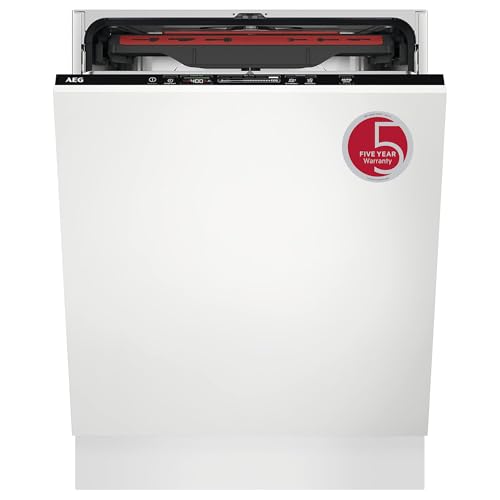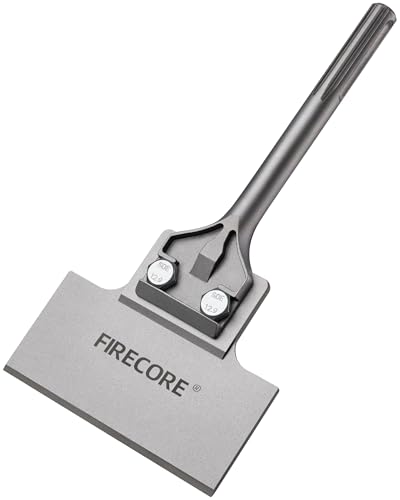




Granite is a popular choice for countertops and other surfaces due to its durability and aesthetic appeal. However, when it comes to cleaning and maintaining granite, it’s important to be cautious and avoid using harsh chemicals that can damage the stone. One common cleaning agent that people often wonder about is bleach. Is it safe to use bleach on granite?
The short answer is no, it is not safe to use bleach on granite. Bleach is a strong and abrasive chemical that can cause damage to the surface of the stone, leading to discolouration and etching. Granite is a porous material, meaning it can absorb liquids and chemicals. Bleach can seep into the pores of the granite and cause irreversible damage.
Instead of using bleach, it’s best to opt for gentle and specialised granite cleaners that are specifically formulated to be safe for stone surfaces. These cleaners are designed to effectively cleanse the granite without causing any harm. Additionally, it’s important to regularly seal the granite to provide an extra layer of protection against staining and damage.
Do: Clean up spills promptly using a soft cloth or sponge and a mild cleaner specifically designed for granite. Wipe the surface dry to prevent watermarks.
Don’t: Use bleach, ammonia, or any acidic cleaner on granite. Avoid abrasive cleaning tools such as steel wool or scouring pads, as they can scratch the surface.
By following these do’s and don’ts, you can ensure that your granite surfaces remain beautiful and well-maintained for years to come.
Using Bleach on Granite: Important Dos and Don’ts
Do:
- Use a diluted bleach solution on granite surfaces.
- Follow the manufacturer’s instructions for diluting bleach.
- Test the bleach solution on a small, inconspicuous area of the granite before applying it to the entire surface.
- Wear gloves and protective eyewear when working with bleach.
- Clean up spills and drips immediately to prevent staining or damage to the granite.
- Rinse the granite surface thoroughly with clean water after using bleach.
- Use a soft cloth or sponge to apply and wipe off the bleach solution.
- Regularly seal the granite to maintain its protective barrier.
- Consult with a professional if you are unsure about using bleach on your specific type of granite.
Don’t:
- Use undiluted bleach directly on granite surfaces.
- Leave bleach solution on granite for an extended period.
- Use bleach on colored or dyed granite surfaces.
- Use abrasive materials or tools, such as scouring pads, when cleaning granite.
- Mix bleach with other cleaning products, as this can result in dangerous chemical reactions.
- Use bleach on granite countertops or surfaces that are already damaged or cracked.
- Use bleach on outdoor granite surfaces that are exposed to direct sunlight, as this can cause fading or discoloration.
- Overuse bleach or rely on it as the sole cleaning method for granite, as frequent exposure can deteriorate the surface over time.
Following these dos and don’ts will help ensure that you can safely and effectively use bleach on your granite surfaces without causing any damage. Remember to always exercise caution and if in doubt, consult with a professional.
Understanding the Safety of Bleach on Granite
Introduction
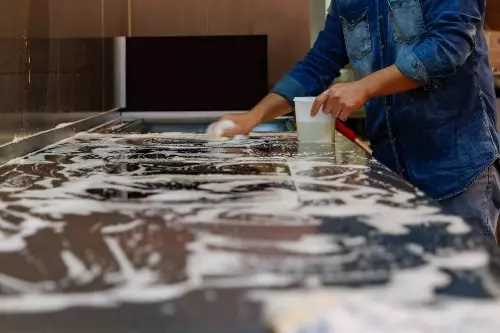
Bleach is a commonly used household disinfectant that is known for its strong cleaning abilities. However, when it comes to cleaning granite surfaces, it is important to understand whether bleach is safe to use or not. In this article, we will explore the potential risks and benefits of using bleach on granite countertops, and provide some do’s and don’ts to ensure the proper care and maintenance of your granite.
Potential Risks
While bleach is a powerful cleaning agent, it can be harmful to certain surfaces, including granite. Here are some potential risks associated with using bleach on granite:
- Discoloration: Bleach can cause the color of the granite to fade or change over time, resulting in a patchy or uneven appearance.
- Etching: Bleach is highly acidic and can etch the surface of granite, creating dull spots or a rough texture.
- Weakening of Sealant: Continuous use of bleach can weaken the sealant on your granite, making it more susceptible to stains and damage.
Safe Cleaning Practices
While bleach may not be the best option for regular cleaning of granite surfaces, there are safe alternatives that can effectively remove dirt and bacteria. Here are some do’s and don’ts to consider:
- Do: Use a mild, pH-neutral cleaner specifically designed for granite surfaces. These cleaners are safe and effective at removing grime without causing any damage.
- Do: Clean up spills immediately to prevent staining. Use a soft cloth or sponge and mild soap diluted in water to gently wipe away any spills.
- Don’t: Use abrasive cleaners, scrub brushes, or scouring pads on your granite surfaces, as these can scratch or damage the surface.
- Don’t: Leave acidic or citrus-based substances, such as vinegar or lemon juice, on the granite for extended periods, as they can also cause damage.
The Importance of Regular Maintenance
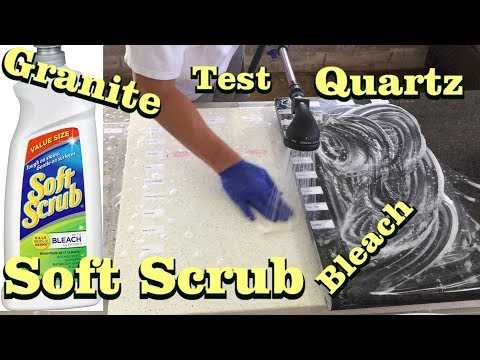
Proper maintenance is key to preserving the beauty and longevity of your granite countertops. Here are some additional tips to keep in mind:
- Regularly clean your granite surfaces with a soft cloth or sponge and a mild, pH-neutral cleaner.
- Wipe up spills immediately to prevent staining.
- Reapply sealant annually to protect the granite from stains and damage.
- Use cutting boards or trivets when placing hot pans or sharp objects on your granite countertops.
| Do’s | Don’ts |
|---|---|
| Use a mild, pH-neutral cleaner | Use bleach or abrasive cleaners |
| Clean up spills immediately | Leave acidic or citrus-based substances on the granite |
| Regularly maintain and reapply sealant | Use scouring pads or scrub brushes |
Do Dilute Bleach Properly
When using bleach on granite countertops, it is important to dilute it properly to ensure the safety of both the surface and the user. While bleach can be effective in killing bacteria and removing stains, it can also damage the granite if used in its concentrated form.
To dilute bleach properly, follow these steps:
- Start by preparing a solution of 1 part bleach to 10 parts water. This ratio is recommended for most granite surfaces and ensures that the bleach is not too strong.
- Measure the appropriate amount of bleach and water, depending on the size of the area you need to clean. It is important to use measuring cups or containers to achieve the correct ratio.
- Combine the bleach and water in a clean container, such as a bucket or spray bottle. Mix them well to ensure they are thoroughly combined.
- Before applying the diluted bleach solution to the granite countertop, make sure to test it on a small, inconspicuous area first. This will help you determine if the solution is safe to use and if it causes any adverse reactions or discoloration.
Remember, it is crucial to never use bleach directly on the granite surface without diluting it, as this can cause etching, discoloration, or other damage. Diluting bleach properly allows you to take advantage of its cleaning properties while protecting your granite countertop.
Don’t Use Undiluted Bleach on Granite
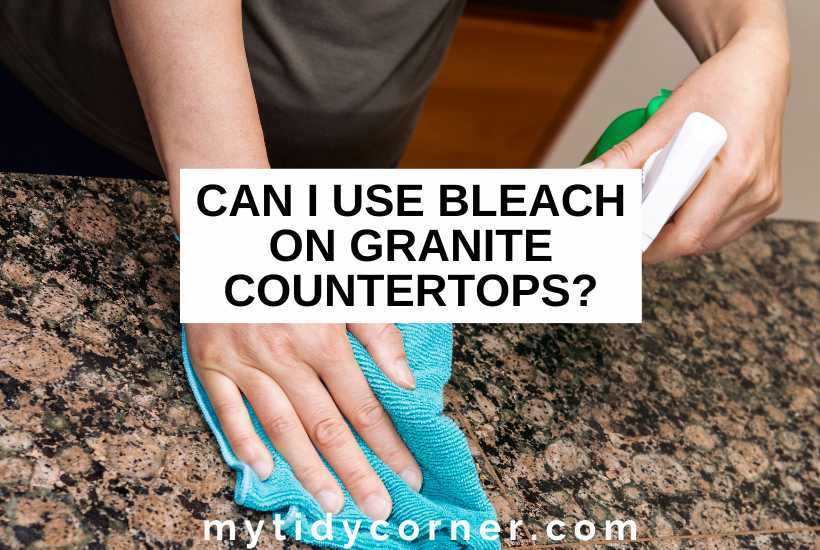
Using undiluted bleach on granite can cause damage to its surface and should be avoided. Bleach is a strong, alkaline substance that can react with the minerals in granite, leading to etching, discoloration, or even cracking. It is important to follow the proper cleaning guidelines to ensure the longevity and beauty of your granite countertops or surfaces.
Instead of using undiluted bleach, opt for a gentler cleaning solution that is specifically designed for use on granite. There are many granite cleaners available in the market that are formulated to effectively clean granite without causing any damage.
When cleaning granite, it is important to remember the following do’s and don’ts:
Do’s:
- Use a pH-neutral granite cleaner that is specifically formulated for use on natural stone surfaces.
- Read and follow the instructions on the cleaner’s label carefully.
- Wipe up spills and stains immediately to prevent them from seeping into the granite.
- Use a soft, non-abrasive cloth or sponge for cleaning to avoid scratching the surface of the granite.
- Use a separate cutting board for chopping and cutting to prevent potential damage from sharp objects.
Don’ts:
- Avoid using harsh or acidic cleaners, such as undiluted bleach, vinegar, or lemon juice, as they can damage the granite.
- Do not use abrasive scrub brushes or cleansers that can scratch the granite surface.
- Avoid placing hot pans or pots directly on the granite as it can cause thermal shock and potentially crack the stone.
- Do not use homemade cleaning solutions without proper research, as they may contain ingredients that can harm the granite.
By following these guidelines and avoiding the use of undiluted bleach on granite, you can maintain the beauty and durability of your granite surfaces for years to come.
Protecting Yourself When Using Bleach
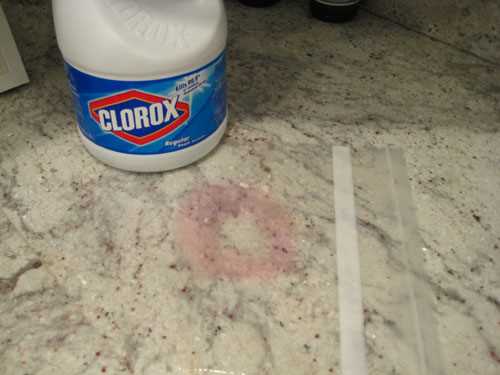
When using bleach to clean granite surfaces, it is important to protect yourself to ensure your safety. Bleach is a harsh chemical that can be harmful if not used properly.
Here are some important tips to remember when using bleach:
- Always wear protective gloves to prevent direct contact with your skin. The chemicals in bleach can cause skin irritation and burns.
- Wear safety goggles to protect your eyes from any splashes or fumes that may occur during the cleaning process.
- Work in a well-ventilated area to avoid inhaling any fumes. Open windows and doors to allow for proper air circulation.
- Avoid mixing bleach with other cleaning products, as this can create toxic fumes. Stick to using bleach on its own.
- Read and follow the instructions on the bleach bottle carefully. Different brands and concentrations may have different usage instructions.
- Keep bleach away from children and pets. Store it in a secure location, out of their reach.
By following these precautions, you can protect yourself and ensure a safe cleaning experience when using bleach on granite surfaces.
Avoid Using Bleach on Colored Granite
While bleach can be a useful cleaning agent for many surfaces, it is not recommended for use on colored granite. Bleach contains harsh chemicals that can cause damage and discoloration to colored granite countertops.
Why Avoid Using Bleach?
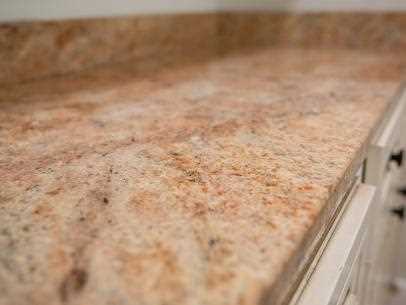
- Bleach is a strong oxidizing agent that can react with the minerals in colored granite, causing it to lose its natural color and shine.
- The chemicals in bleach can also weaken and degrade the sealant on the granite surface, leaving it vulnerable to stains and damage.
- Using bleach on colored granite countertops can result in unsightly patches, streaks, and even permanent damage to the surface.
Safe Alternatives for Cleaning Colored Granite
Fortunately, there are safe and effective alternatives to bleach for cleaning colored granite countertops. Here are a few options:
- Mild Dish Soap: Mix a few drops of mild dish soap with warm water and use a soft cloth or sponge to gently clean the granite surface. Rinse thoroughly and dry with a clean cloth.
- Granite Cleaner: Use a granite cleaner specifically formulated for use on colored granite. Follow the instructions on the product label for best results.
- Baking Soda Paste: Create a paste by mixing baking soda with water. Apply the paste to the stained area, gently scrub with a soft cloth, and rinse thoroughly.
Preventive Measures for Colored Granite Maintenance
To keep your colored granite countertops in good condition, it’s important to take preventive measures:
- Wipe up spills immediately to prevent staining.
- Use coasters or placemats under glasses and hot pads or trivets under hot pans to protect the surface.
- Avoid using abrasive cleaning pads or brushes that can scratch the granite.
- Regularly seal the granite surface to maintain its shine and protect it from stains.
By avoiding bleach and using proper cleaning methods, you can keep your colored granite countertops looking beautiful for years to come.
Safe Alternatives to Bleach for Cleaning Granite
While bleach is a commonly used cleaning agent, it is not recommended for cleaning granite surfaces. Bleach can corrode and damage the surface of granite, leading to permanent damage. Fortunately, there are several safe alternatives to bleach that you can use to effectively clean your granite countertops or tiles.
1. Mild Dish Soap and Water
One of the safest and most effective alternatives to bleach is a mixture of mild dish soap and water. Simply mix a few drops of dish soap with warm water in a spray bottle or bucket. Use a soft cloth or sponge to gently clean the granite surface, taking care not to scrub too hard.
2. Isopropyl Alcohol
Isopropyl alcohol is another safe alternative to bleach for cleaning granite. It is effective at removing dirt, grime, and stains without causing damage to the surface. Dilute the alcohol with water and use a soft cloth to clean the granite.
3. Hydrogen Peroxide
Hydrogen peroxide is a natural disinfectant that can be used to clean and sanitize granite surfaces. Mix equal parts of hydrogen peroxide and water in a spray bottle, then spray and wipe the granite surface with a soft cloth.
4. Baking Soda Paste
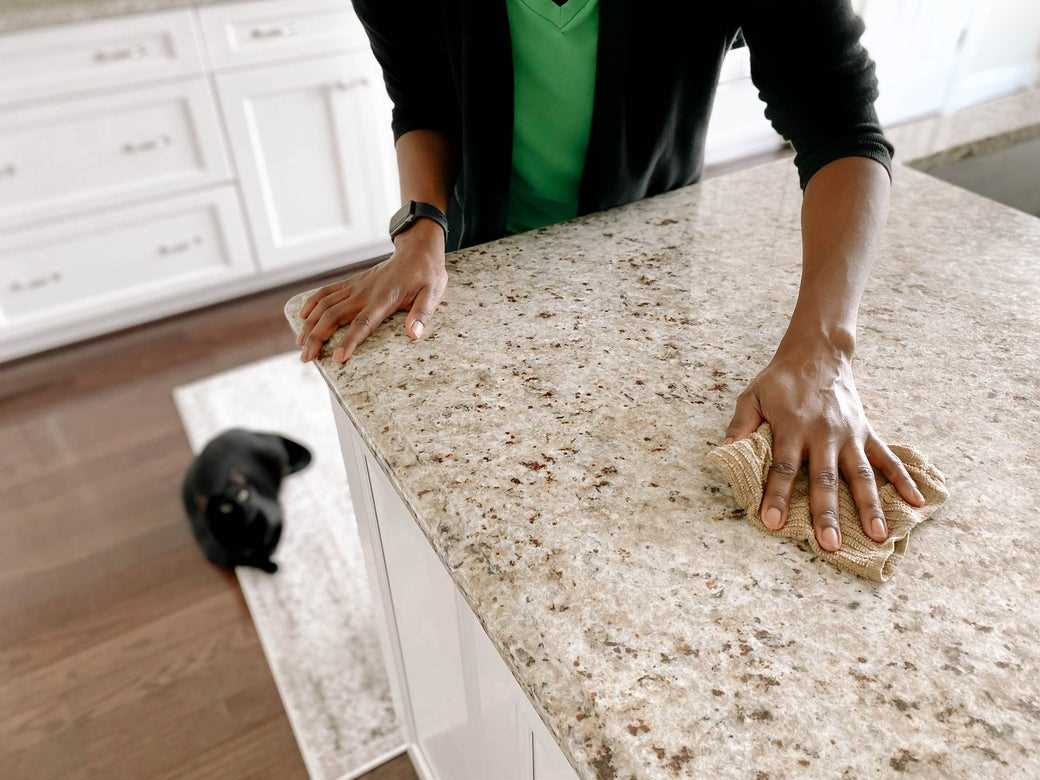
Baking soda is a gentle abrasive that can help remove stubborn stains and grease from granite. Mix baking soda with water to create a thick paste, then apply the paste to the stain and let it sit for a few minutes before gently scrubbing with a soft cloth.
5. Vinegar and Water
Although vinegar is acidic, it can be used safely on granite as long as it is diluted with water. Mix equal parts of vinegar and water in a spray bottle, then spray and wipe the granite surface with a soft cloth.
When using any of these alternatives, it is essential to rinse the granite surface thoroughly with clean water and dry it with a soft cloth. Avoid using abrasive scrub brushes or harsh cleaning chemicals, as they can damage the granite. Regular maintenance and cleaning with safe alternatives will help keep your granite looking beautiful for years to come.
FAQ
Can I use bleach to clean my granite countertops?
Yes, you can use bleach to clean your granite countertops, but you need to be cautious. Bleach is an effective disinfectant, but it can damage the surface of your granite if not used correctly.
What precautions should I take when using bleach on granite?
When using bleach on granite, it is important to dilute it properly. Mix one part bleach with ten parts water before using it. Also, make sure to rinse the bleach off the granite surface with water after cleaning to prevent any lingering residue from causing damage.
Will bleach discolor or fade my granite?
If used properly, bleach should not discolor or fade your granite. However, if the bleach is not properly diluted or if it is left on the surface for too long, it can cause discoloration. It is important to follow the proper cleaning instructions to avoid any damage to your granite.
Is there an alternative to using bleach on granite?
Yes, there are alternative cleaners to use on granite countertops. You can use mild dish soap and water to clean your granite. There are also specific granite cleaners available in the market that are safe for use on granite surfaces.
Are there any products I should avoid using on granite?
Avoid using acidic or abrasive cleaners on granite. This includes vinegar, lemon juice, ammonia-based cleaners, and scrubbing powders. These can cause etching or scratches on the surface of your granite.
Can bleach kill bacteria on granite?
Yes, bleach is a powerful disinfectant and can effectively kill bacteria on granite surfaces. It is important to properly dilute the bleach and follow the instructions for cleaning to ensure bacteria are killed while protecting the granite from damage.
What should I do if bleach accidentally spills on my granite?
If bleach accidentally spills on your granite, it is important to act quickly. Immediately rinse the area with water to dilute and remove the bleach. If the spill has been left for too long, it may cause discoloration or damage to the granite. In such cases, it is best to seek professional help to repair the damage.

